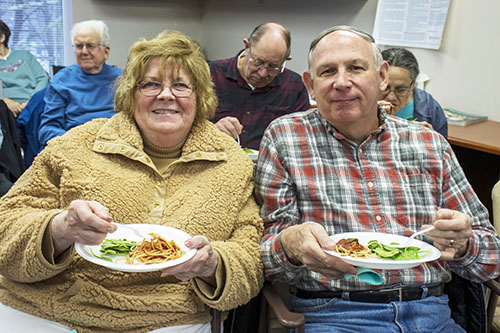
Strategic Question: How will Chester County Hospital promote optimal health to reduce the impact of chronic diseases and to enhance overall outcomes and quality of life?
Implementation Plan: The hospital will partner with the American Heart Association and collaborate with primary care practices to offer education and ongoing support through its Heart Failure Support Group.
For many living with heart failure, their greatest challenges begin after they’re discharged from the hospital. More than 20 percent are readmitted within 30 days, according to the American College of Cardiology. That number jumps to nearly 50 percent after six months. And the average cost of those hospitalizations, the Centers for Medicare and Medicaid Services says, runs a little over $9,000 per patient.
Enter Chester County Hospital’s Living With Heart Failure support group, which formed in the summer of 2018. The group meets at 2 PM on the second Thursday of each month in the medical office building across the street from the hospital. It’s open to both heart failure patients living in the area and their caregivers. Participants are referred through their primary care physicians, word of mouth, or through their cardiovascular providers.
Rebecca Mountain, DNP, RN
Heart Failure Coordinator
"Because of the high readmission rate, we recognized a need to offer ongoing support to those with congestive heart failure," says Rebecca Mountain, DNP, RN, heart failure coordinator for Chester County Hospital. Mountain oversees the support group. She developed it with Susan Pizzi, MS, RN, the hospital’s coordinator for Community Health Education. "We know that those who practice good self-care will have a better chance of doing well at home and will have fewer hospital readmissions. We also know that many aren’t as consistent with their self-care as they need to be. So, a support group can help by exposing them to further education about how to take care of themselves."
Forging a New Relationship with Food
The typical self-care regimen for someone living with heart failure includes attending doctors’ appointments, which can be frequent, taking medications as prescribed, and staying as active as possible, even if that means taking short walks throughout the course of a day.
The part that proves to be most difficult, Mountain says, is the diet, which she describes as “very strict and low in sodium.” The American Heart Association recommends consuming no more than 1,500mg of sodium per day—and that’s for everyone, not only those living with heart failure. On average, however, American adults eat more than 3,400mg of sodium daily, with most of it coming from the food we buy at the grocery store.
"The diet can be overwhelming. It's a huge learning curve for most," Mountain admits. "So, anything we can do to remind them of what they need to be doing and help it to feel a little less daunting is likely to make a meaningful difference."
To that end, Mountain invited the American Heart Association to partner with the hospital in presenting the support group. A greater emphasis has been placed on the diet since the organization’s involvement In December 2019, a chef led the group through a cooking demonstration using only low-sodium ingredients. At the end of the meeting, everyone was given a 13-pound box of fresh produce to take home with them, along with some easy recipes. Another cooking demonstration took place in February.
Group members have also received, courtesy of the American Heart Association, low-sodium cookbooks, weekly medication organizer boxes, automated blood pressure cuffs, and scales. Those living with heart failure need to weigh themselves daily. Sudden weight gain could be an indication that they’re retaining fluid, which is the congestion part of heart failure. That congestion only adds to the weakened heart’s workload.

Attendees at an AHA-sponsored Living With Heart Failure Support Group
enjoy a low-sodium cooking demonstration.
Finding Comfort in Friends
Beyond the self-care guidance and the helpful items donated by the American Heart Association, another important benefit of the support group is the sense of community it fosters. Heart failure can be an isolating disease that limits your interactions to doctors and caregivers. By simply being around others in a similar position on a consistent basis, opportunities arise to feel a little more connected.
While Mountain is working to grow the support group, attendance has tripled in the year since it formed. More importantly, Mountain says she’s noticed in recent months that the group’s becoming closer-knit. Its members are more comfortable asking questions of the presenters and framing them around their particular concerns.
"It can take a while for that type of environment to develop, so it’s been heartwarming to see," Mountain says.
There are plans to extend the support group’s reach to Southern Chester County. This group will meet at Jenner’s Pond, a continuing care retirement community in West Grove, PA. Like the Living With Heart Failure group that meets at the hospital, participation is free.